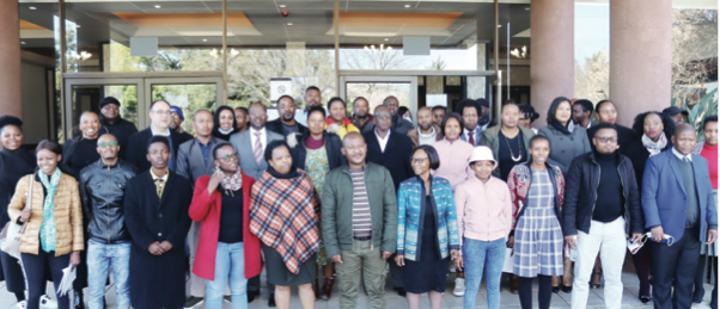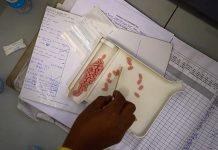Africa-Press – Lesotho. The government has revived its participation in the African Peer Review Mechanism (APRM), its processes and activities following the initiative’s 2012 demise in the country – blamed on lack of political will.
AMPR is an Africa’s premier governance self-assessment and promotion tool towards enhancing economic development, participatory democracy, peace and eternal tranquility.
Lesotho became the 12th African Union (AU) member state to voluntarily join APRM in July 2004, following its inception in 2003, but its operations in the country stopped in 2012.
In its first step to resuscitate national commitment in the self-assessment effort, APRM hosted its first media training to sensitise and equip the media fraternity with requisite information on APRM processes in Lesotho.
It also sought to encourage sustained consistent reporting and coverage of the APRM process by developing a national media strategy and to foster publicity, awareness, broad participation and create a channel for communication and interaction between the public, government, civil society and the media in Lesotho.
The training was also meant to establish a network of communication to disseminate APRM reports and publications and coordinate APRM’s communications efforts – the flow of information from the secretariat to the national offices, to the media and the public.
Speaking at the two-day training in Maseru on Monday this week, communications minister Tšoinyana Rapapa reminded those present that Lesotho was last reviewed in 2009 and some lessons learned included the fact that priority needs to be given to the technical details in setting up the structure of APRM in countries submitting reviews, including Lesotho.
He said, however, because of lack of political will, Lesotho failed to avail the needed resources; noting that this was bound to change as the government intends to strengthen its participation in the APRM even though it still faces challenges of financial, technical and political nature.
He said these challenges and operations by the APRM are unknown to Lesotho journalists, further articulating that its high time journalists are capacitated so that they specialise in different areas of their field, and be able to report with full understanding of how APRM functions and to give public substantive information.
“I may be wrong but to my understanding, there are no clear reporting mechanisms in place for journalists in the country to report step by step processes in Lesotho and progress in a systematic manner that informs the nation about APRM processes and its progress. Also, lack of adequate knowledge by the media limits the need for African ownership of the initiative,” Rapapa noted.
He said the absence of the engagement of the media as an enabler raises concerns about the essence of the APRM, its credibility and transparency as people-driven process for development; thus the media should be adequately equipped with relevant information concerning the APRM.
Active Lesotho participation in the APRM was the envy of the region he said. He added, now that the government has decided to revive the APRM in the country, the country’s profile will rise by physically and practically providing services to the public in a tangible way which can easily be seen by the public.
He said it is, therefore, imperative that the government ensures revival of APRM Lesotho Chapter which will also fulfil the ministry’s obligations under its mandate and Lesotho to abide by the treaties and protocols it has signed with African Union (AU) and APRM.
In an interview with this publication, Executive Director of the Lesotho Council of Non-Governmental Organisations (LCN), Seabata Motsamai, said APRM works with many African countries and has, among others, encouraged countries’ political and economic stability.
He said even though it is able to achieve these, a country’s commitment and determination to work with the APRM are of most importance. Motsamai said when Lesotho started working with the APRM he was the deputy chairperson of the governing council that was overseeing the work of the APRM.
He said Lesotho’s 2012 government showed no interest in the APRM and, as a result, its work stopped then. Motsamai continued that the APRM remained a good initiative for the country as it gives it an opportunity to compare itself with other countries on how it is handling national issues and learn from other countries how it can improve for the better.
He said it was unfortunate that the efforts by the APRM were halted and eventually stopped by past governments. Motsamai said because of lack of interests in APRM, the country has been unable to determine whether it is doing well in terms of governance, service delivery and financial growth as compared to other countries.
He said being able to compare the country’s progress or standard with other countries helps Lesotho to work harder on its shortcomings and also highlight its achievements.
He said civil society groupings that submit reports to the APRM will have to work very hard to persuade the government to take into consideration their findings enclosed in their submissions and even ensure that recommendations are implemented.
Acting Chief of Staff APRM Continental Secretariat, Advocate Batlokoa Makong, said the APRM has visited Lesotho to help the country to revive the initiative in the country.
He said their work includes fostering the adoption of policies standards and practices leading to political stability, high economic growth, sustainable development and accelerated regional and continental economic integration with codes and standards contained in the declaration of democracy.
For More News And Analysis About Lesotho Follow Africa-Press






